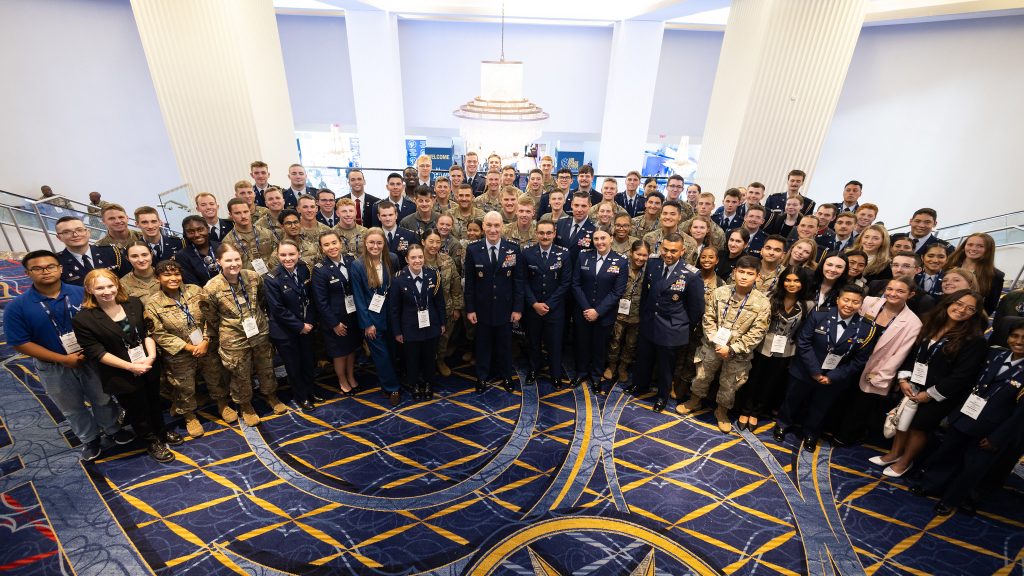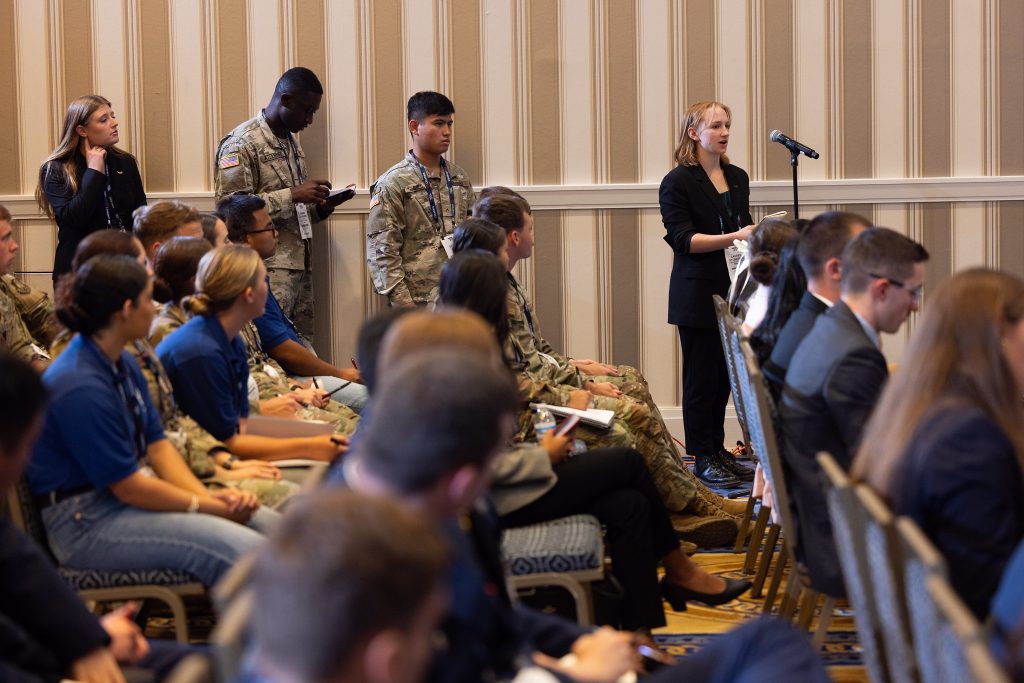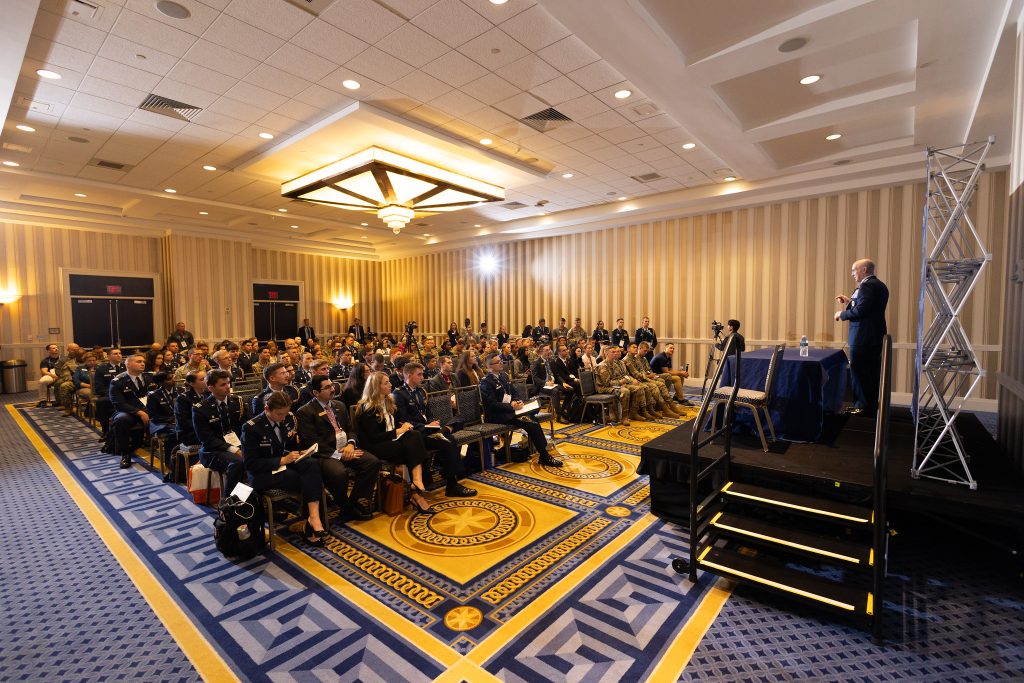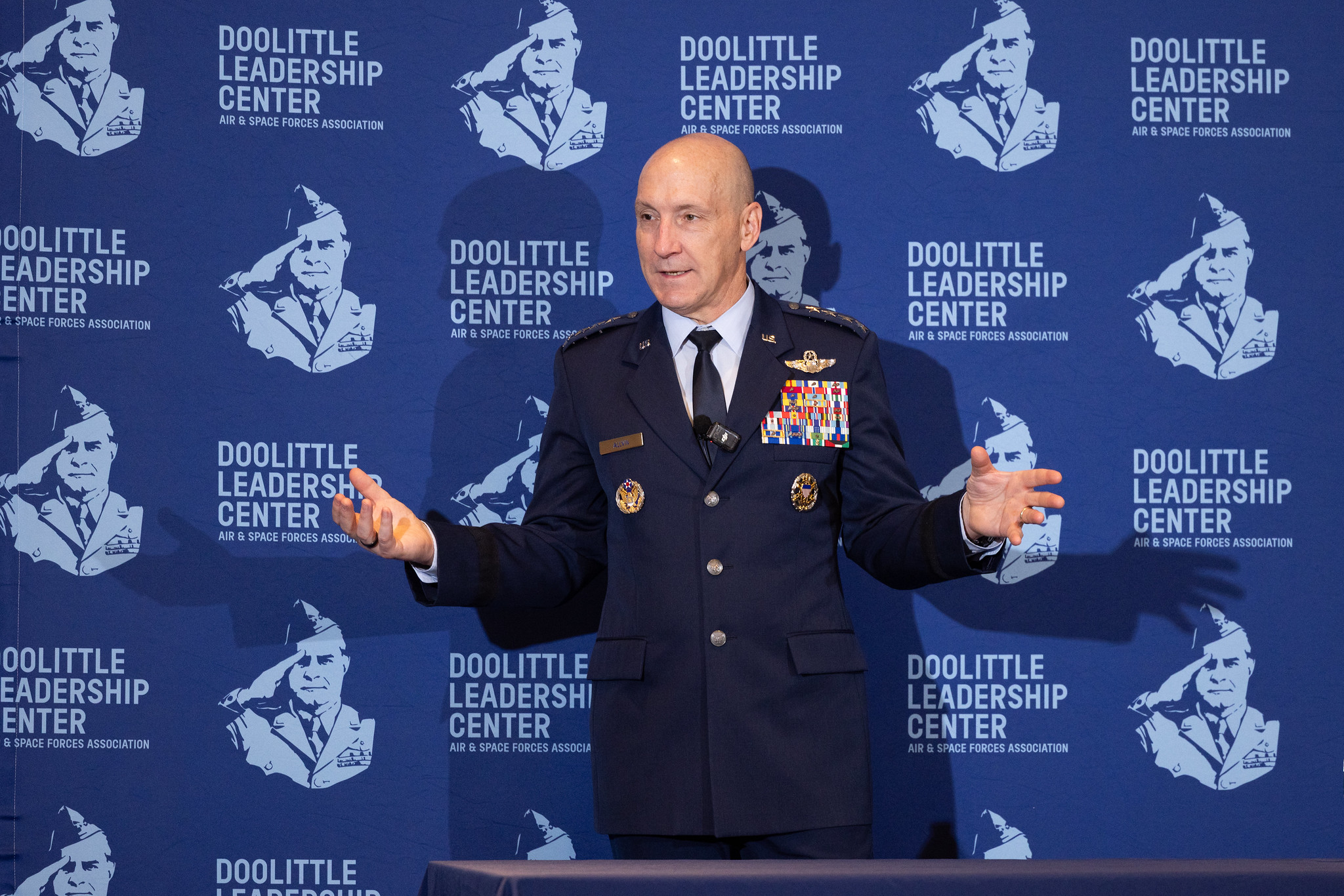Outgoing CSAF Passes on Leadership Tenets to 150+ Cadets
October 16, 2025 | By Juanita Henry
More than 150 cadets and students had the rare opportunity to pick the brain of Air Force Chief of Staff Gen. David Allvin during an open forum at AFA’s 2025 Air, Space & Cyber Conference. The Q&A was the latest installment of the Doolittle Leadership Center’s “Senior Mentorship for Junior Leaders” series, which introduces high school- and college-aged students to some of the highest-ranking leaders in the Air Force and Space Force.
This was Allvin’s second appearance in the Q&A series, having opened up to cadets alongside Chief Master Sergeant of the Air Force David Flosi at the 2024 Air, Space & Cyber Conference. As Allvin prepares to retire as the 23rd CSAF in the coming months, cadets from Air Force ROTC Detachments and Arnold Air Society/Silver Wings squadrons from around the country, as well as Civil Air Patrol cadets flocked to hear his leadership insights and experiences firsthand.
“Whether you serve 40 years or four years… if every single day you live that commitment,” Allvin told them during his opening remarks, “serve with honor every single day you serve— you’ve done our nation a great service.”
Throughout the hour-long Q&A, cadets lined up at the microphone to ask Allvin leadership questions that ranged from personnel to technology to the future of warfare. When asked about loyalty and leadership, he warned about the dangers of prioritizing individuals over the institution.
“When you go through your career and you stake everything on the individual rather than the team, it can come back to bite you,” he said. “Breaking the institution is much more deleterious than just maybe setting aside an individual.”
Allvin also recalled an experience in Afghanistan when nine Airmen under his command were killed in what became known as the NATCA-9 incident—a moment that tested his courage as a leader. “[I] felt like I needed to preserve or restore the dignity of those individuals, which was a righteous thing to do,” he said. “I still feel that to this day—that we needed to right that wrong, that I needed to speak for the dead who couldn’t speak for themselves and say, ‘This is unacceptable. This is not how you honor service.’”
He added a reflection on moral courage and imperfection. “Sometimes when we are looking at our morals and ethics, there is great value in taking the right actions…but we always have to look at the manner in which we execute it,” he said.
In discussing the mindset required to lead effectively, Allvin told cadets that leaders must balance empathy and discipline. “You can give tough leadership and still show empathy…and still show that you care,” he said. “You can also be kind and not be cuddly.” He encouraged them to reflect on how their leadership affects others: “Ask yourself, are they getting better in spite of me or because of me?”



One cadet asked a question about artificial intelligence, to which Allvin warned about the dangers of removing humans from warfare and accentuated that it’s the responsibility of leaders to lead humans, not replace them.
“Taking the humans out of warfare is a dangerous, dangerous thing,” he said. “If it becomes too easy, then it maybe becomes a first choice—and then we’ve lost our humanity.”
He added that while technology continues to evolve, judgement and ethics must remain at the center of military decision-making.
“We have to be careful,” he said. “We have known a certain way of doing things for 34 years since the end of the Cold War…the pace of change is moving faster… It’s up to you to help lead up as well,” he said, explaining that young leaders must help drive change within the institutions, even when it challenges old ways of thinking.
Allvin also spoke about the idea of reverse mentorship, reminding cadets that senior leaders can learn from the perspectives of younger Airmen and Guardians.
When asked about challenges he faced in his own career, Allvin spoke about perseverance and growth—not just in the military, but at home with his wife, Gina, and his children.
“I’ve never been a quick starter,” he said. “So, the one thing that Gina and I tell our kids [is that] our favorite word is perseverance,” he said, emphasizing the importance of persistence through difficulty.
He said that future wars would test not only physical ability but also mental resilience, warning that a peer conflict would bring psychological challenges unlike anything the force has faced before. Without that resilience, he said, “we’ll be in paralysis, we’ll be in shock, and the fight will be over before we recover.”
He encouraged cadets to remain curious and open-minded. “Always challenge assumptions,” he said. “Always look at things differently.”
The Doolittle Leadership Center’s Senior Mentorship for Junior Leaders event continues to highlight the power of direct engagement between senior leaders and leaders who are just getting started—fostering open, thoughtful dialogue that prepares the next generation to lead with purpose and perspective.
“Gen. Allvin is exactly the kind of leader we want our cadets to hear from,” said Col. Patrick Donley, USAF (Ret.), the Director of the Doolittle Leadership Center. “His career and his character exemplify what it means to serve with purpose and integrity. We’re incredibly grateful for his time and for the example he continues to set for junior leaders who want to lead well.”
The Doolittle Leadership Center also extends its mission through its podcast, Building Better Leaders, which features candid conversations with influentials leaders about their stories and how they have learned to lead. Hosted by Donley, the series takes place in a variety of locations across the globe as he tours with the DLC’s on-location leader development workshops.
